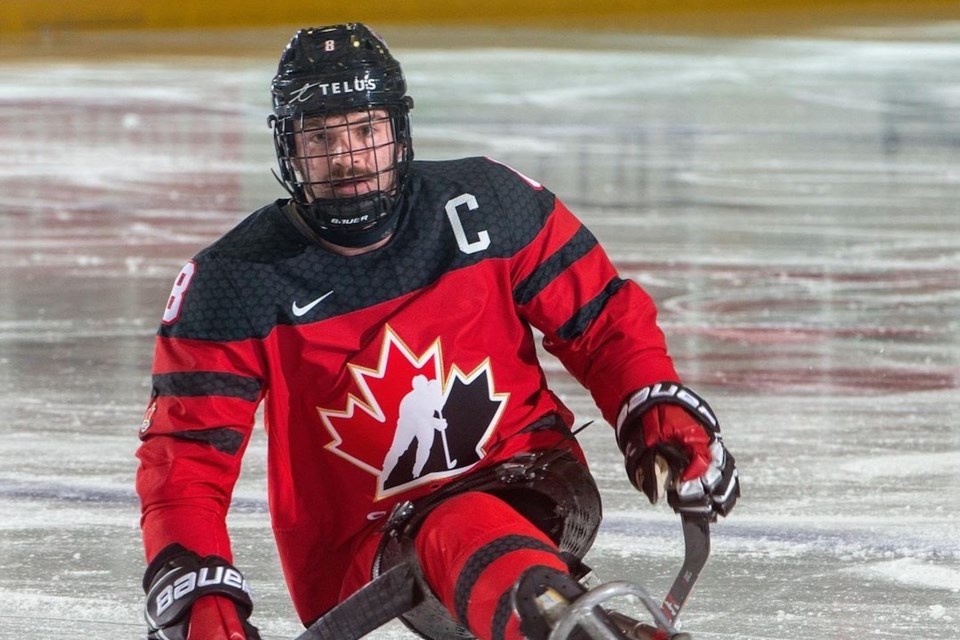Blue Mountain’s Woodview Mountaintop Skating Loop set the stage for the first-annual Terry Fox Sledge Skate of Hope this past Sunday.
On Feb. 21, Tyler McGregor, a two-time Paralympian and the captain of Canada’s national sledge hockey team, skated his sledge 25 kilometres along the scenic ice trail with an initial goal of raising $25,000 for the Terry Fox Foundation.
He completed the feat in approximately two hours, surpassing his goal with a current total of $27,260 funds raised and counting.
“It was honestly amazing. The sun was shining, it was a beautiful morning. Really, we couldn’t have asked for a better day,” said McGregor, who is currently embracing some much-needed recovery days.
“We are so grateful for people’s support,” he added. “Skating, especially outdoors, is a reminder of where I fell in love with the game of hockey in the first place, and I think that is the same for so many young kids in Canada.”
McGregor grew up in Forest, ON and started playing hockey when he was just three years old.
Like many Canadians, he always dreamed of playing in the National Hockey League. When he was 15-years-old — an able-bodied AAA hockey player well on his way to accomplishing that dream — McGregor was diagnosed with Spindle Cell Sarcoma. In order to save his life, his left leg had to be amputated, ending his hockey career as he knew it.
Rather than giving up, McGregor got to work, and a year later he began playing sledge hockey and quickly emerged as a national star. McGregor cites Terry Fox — both the man and his legacy — as his inspiration that enabled him to persevere.
“Even as a young kid, Terry Fox was a huge inspiration to me and many other Canadians,” said McGregor. “When those circumstances came about, he became even more of a personal hero and inspiration for me in my life.”
McGregor got the idea for the Sledge Skate of Hope a few months ago. The COVID-19 outbreak put his sledge hockey season on hold, and he was determined to do something “ambitious and challenging” that would align all of his passions.
“Something Terry Fox has done for all of us is create a sense of connection and community,” said McGregor. “I think that is something we all aspire for as human beings, and I am happy to be able to do something that can foster that feeling as well.”
Because McGregor’s team is not currently competing, he was able to focus his training on building endurance instead, and said he is fortunate to not have had any wear and tear from a typical hockey season.
McGregor began his skate bright and early at 8 a.m. on Sunday morning (Feb. 21), well before the ice trail opened to the public. Despite a few technical difficulties, he finished 25 kilometres — 23 laps around the 1.1 kilometre trail — in approximately two hours, stopping every five laps for a quick water break.
“It was certainly challenging at times, I think by about my 10th lap I was starting to get sore shoulders and forearms, and my hands are kind of blistered up. But all-in-all I was so lucky to have people there supporting me,” he said.
And he hopes next year, even more people will be able to come out and show their support. McGregor plans to make the fundraiser an annual event, and hopes to grow both the distance and fundraising goal in coming years.
“There were challenges in making this happen with COVID, so we are really excited that we were still able to do it, and to fundraise and raise so much awareness in such a short period of time,” he said. “What is most exciting is that there is so much opportunity to expand on it in so many ways next year.”
Ultimately, he said it’s about building awareness.
“Cancer has literally impacted everybody’s life in some capacity, whether that is directly or indirectly, and it’s something that persists in our lives,” said McGregor.
To put it in context, McGregory said when Terry Fox was diagnosed with cancer over 40 years ago, he was given a 20 per cent chance of survival. Whereas when McGregor was diagnosed — with a very similar cancer — he said he was given an 80 per cent chance of survival.
“With the awareness that is built and the money that is raised to fund cancer research, it has the opportunity to save people’s lives,” he said.
McGregor was surprised by how challenging the feat actually was, saying there were moments he thought his body would give out completely.
“I was able to draw inspiration from how incredible it was that Terry ran 42 km a day, day after day, all while he was still battling cancer,” McGregor said. “I think when you put that into perspective it gives you the additional motivation to continue to push through.”
With more training and preparation, McGregor hopes to match Terry’s distance and skate 42 kilometres next year.
For more information on the event or to donate, visit McGregor’s fundraising page.



